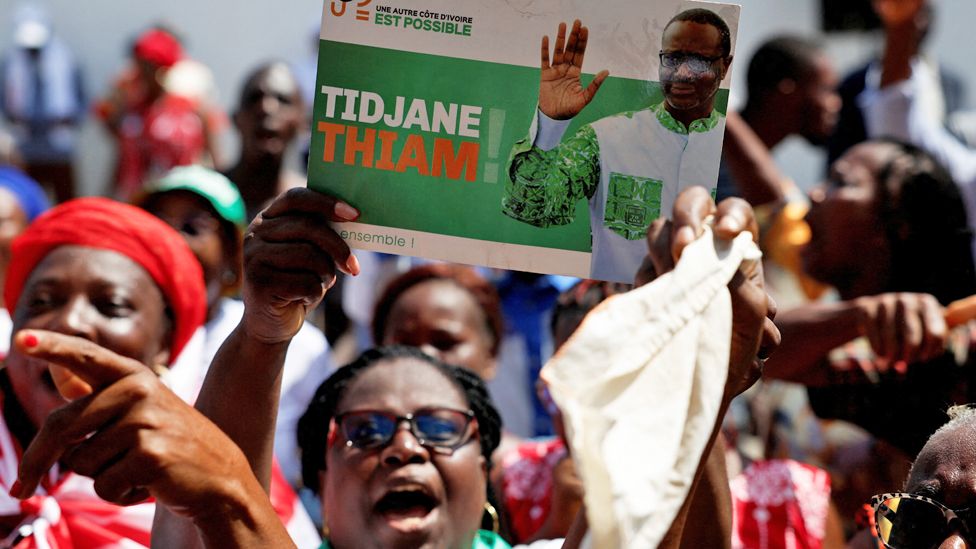The Challenge of Politics in Ivory Coast: Tidjane Thiam’s Citizenship Ruling Casts Shadow on Presidential Aspirations
Ivory Coast, a nation renowned for its cocoa production and a pool of exceptional football talent, is grappling with political turbulence as Tidjane Thiam’s quest for the presidency hangs in the balance. Thiam, a prominent figure in international business, now faces the grim realities of navigating the political landscape of his home country, where questions about democratic practices are emerging amidst growing public skepticism.
A Sudden Halt in Presidential Aspirations
Thiam’s ambition to lead Ivory Coast has hit a significant roadblock following a court ruling on April 22, 2025, which determined he had forfeited his Ivorian citizenship due to acquiring French nationality decades ago. Consequently, this ruling deemed him ineligible to participate in the forthcoming presidential election scheduled for October.
After a lengthy career in global finance, including notable positions as the CEO of Prudential and Credit Suisse, Thiam returned to Ivory Coast in 2022 with the reputation of a competent leader. His ties to the country are deep-rooted as a member of a noble family; he is a great-nephew of the late President Félix Houphouët-Boigny, a revered figure in Ivorian history.
The Political Landscape and Challenges Ahead
Thiam’s emergence as a candidate for the Democratic Party of Ivory Coast (PDCI) followed the death of long-time opposition leader Henri Konan Bédié in 2023. While his nomination on April 17 offered hope for a competitive election, it also comes with the caveat of confronting the current president, Alassane Ouattara, who, at 83, is poised to run for a fourth term backed by the advantages of incumbency.
Despite the challenges, Thiam symbolized a potential shift in governance, attracting voters seeking change. His centrism and technocratic background suggested a continuation of the economic growth Ivorian experienced under Ouattara, which has averaged over 6% in recent years. However, legal obstacles threaten to diminish Thiam’s prospects.
Legal Obstacles and Popular Discontent
The ruling against Thiam is notable in a country where past political convulsions, stemming from identity politics, have left deep scars. Several other political figures, including former President Laurent Gbagbo and former Prime Minister Guillaume Soro, have faced disqualification due to previous convictions. Such exclusions have raised concerns about the fairness of the political process and may further disconnect citizens from their leaders.
With the backdrop of youth unemployment and the appeal of radical ideologies among the younger demographic in West Africa, the current political climate poses risks for stability in Ivory Coast. Should the ruling remain unchanged, the forthcoming elections could lack a strong opposition, intensifying public disillusionment toward the political establishment.
National Identity and the Implications of Thiam’s Case
Thiam’s predicament illustrates the broader complexities of national identity in Ivory Coast. The country’s citizenship laws have been contentious, linked to the divisive “ivoirité” policies in past decades. Although the current political atmosphere has generally avoided inflammatory rhetoric, the court’s decision serves as a reminder of the lingering tensions around identity and citizenship.
Engaging with these identity politics, Thiam argues that the country must reevaluate its stance, pointing out the inconsistency in its approach to nationality laws in light of the successes of Ivorian athletes with dual citizenship.
Future Prospects
With Kadira still awaiting a scheduled court hearing regarding his eligibility to lead the PDCI, a resolution is necessary. As discussions continue among political factions, there remains potential for compromise, but confidence in a resolution is waning. Ouattara’s influence could prove pivotal, especially if he opts to step down, ensuring a stable transition that preserves his legacy.
Table: Key Figures in Ivorian Political Context
| Name | Position | Political Party | Status |
|---|---|---|---|
| Tidjane Thiam | Presidential Candidate | PDCI | Ineligible |
| Alassane Ouattara | President | RHDP | Incumbent |
| Laurent Gbagbo | Former President | PDP | Excluded |
| Guillaume Soro | Former Prime Minister | PDCI | Excluded |
As Ivory Coast prepares for a pivotal election season, the unfolding drama surrounding Tidjane Thiam not only presents a challenge for his political aspirations but may also signify a broader struggle for democracy and a re-evaluation of national identity within the country.


